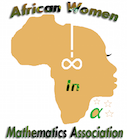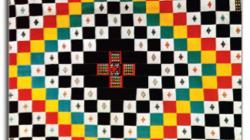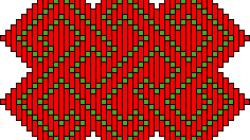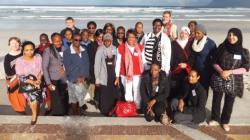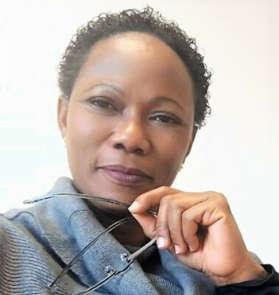
"My dream is to help girls and women under my supervision so they won't have to deal with most of the obstacles I faced"
Education
- 1990 : BSc Statistics. University of Ilorin, Nigeria
- 2001 : MSc Statistics. University of Ibadan, Nigeria
- 2006 : PhD Statistics. University of Ibadan, Nigeria
- 2016 : MPH. Population, Family and Reproductive Health, Ghana
Professional experience
- Feb-Aug 2017: Senior Research Fellow, Institute of Mathematical (ICMAT), Spain
- Since 2013: Associate Professor at KNUST, Department of Kumasi, Ghana
- 2009 – 2013: Senior Lecturer, Department of Mathematics, KNUST, Ghana
- 2005-2009: Lecturer, Department of Statistics, University Abeokuta, Nigeria.
- 2003-2005: Assistant lecturer, Department of Mathematics, Agriculture, Abeokuta, Nigeria.
- 1992-1994: Trainee Accountant, UAC Nig PLC.
Honours and prizes
- Mujeres Por Africa Senior Science Researcher’s fellowship for six months visit to ICMAT, Madrid; 2017
- Lead facilitator: 750,000 Euros National Institute of Mathematics (NIMS), Ghana, research/teaching grant awarded by Petroleum Geo-Services (PGS) and Norwegian Academy of Science and letters; 2013-2016.
- Organization for Women in Science for the Developing World postgraduate fellowship; 2005.
Questionnaire
Your story with mathematics
Can you tell us something about your story? Why did you join the field of Mathematics? How did you discover your passion for mathematics? Or When have you decided to be a mathematician and why?
I loved reading and mathematics in the elementary school. I read a lot from my mother’s encyclopedias and often went to our 11eighbor’s (Dr Elukpo) house to read the story books in his children’s library. I found mathematics easier than other subjects and I scored very good grades in the subject. My interest however, waned in the third to fifth year in secondary school because I could not connect with the teachers who during that period were foreigners and had an accent which I was not familiar with. I however totally enjoyed and loved my statistics classes because the lecturer was full of life and it was impossible not to look forward to his classes. During my A levels, my interest in Mathematics was rekindled and I went on to pursue a BSc in Statistics from at the University of Ilorin from 1986 to 1990. I thoroughly enjoyed my degree programme and was motivated by some of my lecturers. This further fuelled my passion for academics. My parents were completely opposed to the idea of a woman in Mathematics. This explains my career starting in the industry and later returning to postgraduate studies and a career in Mathematics 9 years after obtaining my first degree. So I can be described as a late starter in academics. I love to teach and I find teaching quantitative subjects very appealing because they follow logical reasoning.
What fascinates you about Mathematics?
Mathematics is a multifaceted beauty. Whatever side of her you choose to focus on opens a whole world of discoveries.
Has anyone influenced your decision to become a mathematician and how? Has anyone supported you in your choice and during your career?
My parents totally opposed my being in Mathematics neither did my husband find my quest sensible. One of my lecturers in the undergraduate (Prof Jolayemi) encouraged me to pursue academics, but the main influential figures were my PhD supervisors, Profs J.O. Iyaniwura and S.K. Nokoe. They taught me to push, and Nokoe placed me on his huge shoulders so I could stand tall from start. I always wanted to be an academician and I am much fulfilled to be one today. There are people who have shaped my career. Most especially, Prof Sagary Nokoe, who mentored several early career Nigerian mathematicians. He was personally involved and often pushed me beyond my presupposed limits. His mantra is “believe in yourself”. He is still my mentor. Another person of influence in my career is Prof Wandera Ogana of Kenya. He always brought openings and possibility of grants to my notice. He is an excellent mathematician that I have a great deal of respect for. Late Prof Allotey also played a prominent role in the lives of Mathematicians in West Africa. He was remotely involved in my early career through the workshops he regularly organized for postgraduate students and young academics. I am currently being supported by a terrific female Prof of Food Technology who is also my Provost, Prof Ibok Oduro. She observed that being the only female and also a foreigner in our Department of Mathematics was making me feel isolated and dampening my vim to do new things. She extended her support and together with some other females we have birthed the Women in Science, Technology, Engineering and Mathematics (WiSTEM) in Ghana. I have come to believe strongly that mentoring plays a key role in career development in any and every field of endeavour and I seize every opportunity to mentor any available and willing mentee.
Were there any specific factors that helped you succeed? Would you see it was easy for you to enter your field, and ultimately excel? What challenges did you encounter on the way?
The key factors that have helped me in my own career would be my trust in the goodness of God in sending me some destiny helpers; resolve to pursue my dreams despite initial resistance from my parents who were both well educated, and an unsupportive partner; accessing career development opportunities; hard work and tenacity. I wouldn’t say it was easy entering my field nor has it been any easier staying in it. In this part of the world, a career in Mathematical Sciences is still largely seen as a male territory unlike other places. Being a female means working double hard to justify your being there. This might also result in more animosity but there are a few males who believe in female mathematicians but these crops of persons are far in between. One challenge I have consistently encountered is not being recognized for my contribution. The credit often goes to the male. Another major challenge for me was the age limit placed on several career development opportunities excluded a late starter like myself. I came into academics at 35 and most opportunities had early 30’s as the age limit. The only one I enjoyed which seemed sensitive to women lagging behind was OWSD. I had a fellowship on OWSDs and it’s been a catalyst for my career development.
What is the funniest or most memorable thing that has happened to you while working in mathematics?
The funniest I can recall was the confusion on my middle name at COMPROMAPH2 workshop in Cotonou, the Republic of Benin in 2004 or 2005. My middle name Olusola is unisex in Nigeria, and the letter of invitation had said we would be paired in our hotel rooms, so the organizers assumed I was male and paired me with another Olusola who happened to be male. I arrived and was directed to my room only to find a male who had apparently observed the error from my first name but didn’t prompt the organizers because he wanted to have a good laugh. I was reassigned but the little drama was retold in very different versions and I couldn’t shake off the ‘tag’ the entire programme.
Career and Family
Do you come from an academic family? How does your family regard your career choice? Is it hard to manage both career and private life? Do you have
kids? Tell us about balancing family life with work life?
I am the third of nine children and was always the family’s nerd. Some of my siblings also have second degrees but my family is not academic though both parents were well learned. My parents did not agree to my interest in pursuing a career in Mathematics most probably because they assumed such women would be too tough and no man would want to marry them. My mother did not live to see me in academics but my father did. He was very proud of me and apologized for their interference in my career. My children and my siblings are also very proud of how far I have come given the challenges I have had to overcome. Experiences differ, so it is not a one size fits all when it comes to what works. I however would recommend a very good support system from either family or spouse/partner or close friends. It could prove a major challenge if you find yourself far from home in academics raising young kids with a spouse who thinks you should spend more time in the kitchen than at your study desk. We are divorced today not because either of us was bad, but because of socio-cultural barriers which he couldn’t overcome mentally. It is almost a taboo for a woman to have better qualifications than the husband where he comes from and there was a lot of extended family pressure on him to make a ‘woman’ of his wife. I did try to fit in the mould and yielding to my parents and that had it cost me 9 years. When I got a second chance, there was no going back for me. It would still be a bit hard managing career and family, but it would be less stressful with a good support system. I have a number of female colleagues who have supportive spouses and they are doing very well. I have 3 children; a girl of 24, and 2 boys aged 21 and 11. My oldest child was 6 when I went back to school for postgraduate studies. My youngest was born shortly after I completed my PhD. My daughter completed a BSc Geological Engineering and about to defend her Master’s thesis in Water resource engineering and environmental management. My older son is about graduating with BA Political Studies and my ‘postdoc baby’ is in grade 7 and he is the family’s nerd. One key ingredient in my coping strategy when they were younger was to have a work-space at home. I did as much as I could from home. This helped keeping me perpetually involved in my children’s lives. I also did and still do the school runs except I am out of town. I have kept my life uncluttered and my social cycle deliberately quite narrow because it suits my temperament and works better for me being a single parent. I wouldn’t recommend this to an extroverted woman though. With my kids older, things have become a whole lot easier when it comes to managing the home, although the demands have become more financial. We should always have a little bit of pressure in our lives else things will become too boring I would say.
Women and Mathematics
What were the biggest obstacles you had to overcome? Did you ever have the impression that it would be easier/harder if you were male? What kind of prejudices, if any, did you have to face? How did that make you feel? Were you able to overcome these? Do you have anything else that you’d like to tell us
about?
The biggest obstacles were stereotyping and not being recognized for one’s competences. I did and still do have the impression that it would have been a WHOLE LOT EASIER if I were male. When a woman progresses in a male dominated career here, it is often explained away by ‘you never know who she has had to bed’ etc. I find it extremely infuriating. I have had to overcome it by making sure I am one of the best around in my field. I am presently the only female Mathematics Assoc Prof my university has produced in over 60 years of existence. It’s not easy, but it’s the only legit way to show you are all about business. What I would like to draw your attention to is the middle to late career women. They seem to have been pretty much forgotten. Virtually all the opportunities are targeting early career women, which is not right. Middlelate career women should be exposed to training on management and how they can inform national policy. This in my opinion is the peak of most careers.
Did you encounter any specific difficulties relating to the field of mathematics?
In middle secondary school, I didn’t enjoy mathematics much because my teacher had a barely audible voice and spoke to himself most of the time. I was one of the tallest in class so I sat close to the back. It was pretty bad. Most of my teachers at the university were quite good with the exception of a few who seemed to treat mathematics as an enigmatic phenomenon. Therefore, if the teacher isn’t passionate about the subject, he can’t make disciples of the student. The teachers’ competence and skill especially at the lower schools goes a very long way in making students love or have apathy towards mathematics. Things changed when I got older, I probably have been fortunate to have visited institutions that had almost all I needed. There’s also our education system here, which is still predominantly content and not enquiry based. This keeps us behind and our products not being able to compete fairly on the global stage. I do believe that Staff training and re-training is essential.
Tell us about the organizations for women mathematicians that you are a part of? How has this helped your career?
I am an OWSD fellow and I have had a wonderful time with OWSD. They have room for both early and late starters. I have had a very good exposure through OWSD and collaborated with other members. I am also a founding member of WiSTEM Ghana which is in its infancy stage. Through WiSTEM, I have met a lot of other women in my University that I would probably not have met. We also work together to mentor females in our University and in the communities around our University. I believe no female should pay the price I have paid to pursue her dreams in mathematical sciences.
Do you consider it necessary to organize special programs like Girl’s Day promoting mathematics for girls in schools? What else, do you think, could further be done to support woman with mathematics as their career?
Absolutely necessary. We should also promote female role models especially in communities that have tradition and culture influencing a lot of their decisions.
Teaching mathematics, especially to non-mathematicians, can be a challenge. What is your strategy to catch and keep the attention of your audience? Teaching mathematics can sometimes be a challenge, especially when the audience cannot relate the content, getting them involved in hands on exercises often works. Especially, when it is kept lean on mathematical jargons. I have often used non conventional methods to teach some mathematics concepts, for instance using the movie on Erin Brockovich to teach data collection for scientific research and inferring from empirical evidence.
How would you explain your research to a layman?
I would say that my area of mathematics looks for information in data and how this can be used to improve the lives of the population especially on health related issues.
Can you tell us about the applications of your research, if any?
Patter recognition (spatio-temporal), Analyses involving high dimensional data, assessing the effectiveness of maternal and child health interventions.
Conclusion
What are your biggest achievements, and what your biggest failures?
My biggest achievement is my children and my biggest failure is a marriage that ended in a needless divorce.
Do you have a dream?
My dream is to reproduce several of myself who won’t have to deal with most of the obstacles I faced. I have managed a few, but I want them in their hundreds so that the inverted funnel of women in mathematics can be filled and ultimately become a cylindrical shape.
If you had the option to give advice to a younger version of yourself, what would that be?
I would say know yourself, follow your dream come what may, and never say yes to a man who can’t share your dream or a man who can’t celebrate you.
